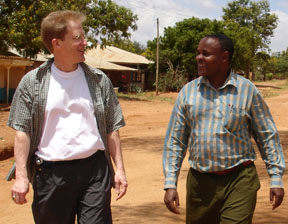 I heard the story of a pastor who was cloistered in his office for prayer. A member of the congregation stopped by, looked in the office and saw the pastor, hands folded, head bowed. He knocked on the doorframe as he entered, saying, “Oh, good, Pastor, I’m glad to see that you’re not busy…”
I heard the story of a pastor who was cloistered in his office for prayer. A member of the congregation stopped by, looked in the office and saw the pastor, hands folded, head bowed. He knocked on the doorframe as he entered, saying, “Oh, good, Pastor, I’m glad to see that you’re not busy…”
Someone also told me about a curious difference between Americans and Tanzanians. When we part company, our farewell is often, “Take it easy.” When Tanzanians part company, they often say, “Work hard.” Neither farewell seems to be effective. Tanzanians continue to struggle with productivity, and Americans continue to struggle with an addiction to busyness.
A couple years back I was invited to work with a church council in a small town in rural Iowa. To give you an idea how rural this town was, my cellphone could not pick up a carrier. We’re talking seriously off the beaten path. In the course of our meeting, congregational leaders complained that they couldn’t get members to participate in ministries because—you guessed it—”everybody is so busy.” After the meeting, I remarked to my wife, “Since when did the culture of busyness invade (name of town withheld) Iowa?”
“I know you’re busy, but…” How many times have you heard (or used) that introduction to an invitation to talk or to do something? Have you ever wondered why we assume that everybody is overly busy to the point of not being able to pay attention to us?
 John Bowen (in Evangelism for “Normal” People) writes about rediscovering the stories of the first witnesses to Christ’s life, death and resurrection in the book of Acts, and realizing that evangelism is inevitably linked with risk:
John Bowen (in Evangelism for “Normal” People) writes about rediscovering the stories of the first witnesses to Christ’s life, death and resurrection in the book of Acts, and realizing that evangelism is inevitably linked with risk: In previous posts, an underlying assumption has been that evangelism is the work of the whole Christian community. I don’t want to sound like I’m completely contradicting that understanding, but evangelism also relies on each individual Christian doing her or his part. The problem is, viewing evangelism as the work of “the whole Christian community” can lead quickly to the conclusion that evangelism is somebody else’s job and not mine.
In previous posts, an underlying assumption has been that evangelism is the work of the whole Christian community. I don’t want to sound like I’m completely contradicting that understanding, but evangelism also relies on each individual Christian doing her or his part. The problem is, viewing evangelism as the work of “the whole Christian community” can lead quickly to the conclusion that evangelism is somebody else’s job and not mine. 
 Since evangelism is built on trusting relationships, one often-overlooked skill is critical to the process: listening. While many church leaders like the one I encountered years ago attempt to motivate us—like salespeople at an Amway meeting—to get out there and “share Jesus” with others, Jesus’ own model suggests a different way.
Since evangelism is built on trusting relationships, one often-overlooked skill is critical to the process: listening. While many church leaders like the one I encountered years ago attempt to motivate us—like salespeople at an Amway meeting—to get out there and “share Jesus” with others, Jesus’ own model suggests a different way.











 A few years ago, in an interview with some church leaders, somehow we wound up talking about my trip that day, and about the fact that I had stopped in a fast food restaurant for lunch. One of the leaders asked me, “Did you share Jesus with the cashier at the restaurant?” I was dumfounded; I didn’t know what to say, other than mumbling a confused, “No?”
A few years ago, in an interview with some church leaders, somehow we wound up talking about my trip that day, and about the fact that I had stopped in a fast food restaurant for lunch. One of the leaders asked me, “Did you share Jesus with the cashier at the restaurant?” I was dumfounded; I didn’t know what to say, other than mumbling a confused, “No?”